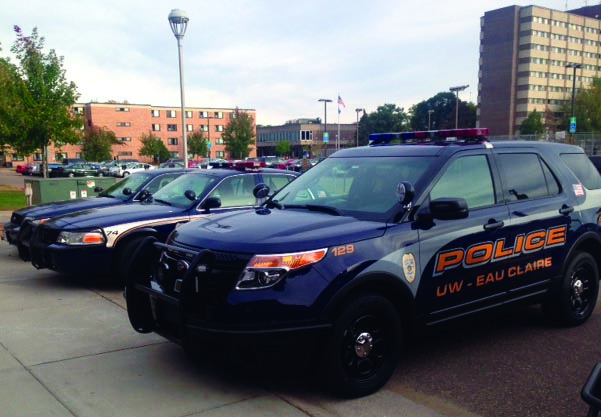Administrative and police approach to violations dependent on situation
Housing penalties more advantageous to students
Photo by FILE PHOTO
April 28, 2015
Reports of underage drinking and drug offenses on UW System campuses, including UW-Eau Claire, have remained fairly constant and fairly high, which was reported in an April 15 story by The Spectator.
But behind the scenes, students are often unaware of the different ways offenses are dealt with in on campus.
The vast majority of offenses are dealt with directly by Housing and Residence Life, according to associate director Deborah Newman.
Newman said the first approach is for Resident Assistants deal with as much as they can, and the campus police are called if things are beyond their ability to deal with, whether it is because of belligerence, safety concerns or drug offenses.
The guidelines for offenses in the dorms are detailed in campus’ judicial code, which is available on the website.
Newman said that while students have the same rights as they would in other private residences, the Housing Contract that they sign before moving in sets expectations of both behavior and consequences, which can be decided by Housing and Residence Life, or by appeals to the Judicial Board, which formed by a group of student representatives from the dorm buildings.
The campus has the ability to open dorm rooms if there is a health or safety concern although Newman says it is not a common approach and that generally if they cannot identify the students within a dorm room the residents of the room will be the ones to receive any citations.
“We respect that adult right and we certainly respect the laws, which is why we don’t key in if you’re just breaking a rule,” Newman said. “And we do have the right to have an expectation that students answer the door to live there.”
Newman pointed out that living in the dorms, however, is not a right and the administration can remove a student if necessary, to maintain is standards of providing the optimum learning environment.
“We want to make sure that our students are safe,” Newman said.
The second route that can be taken in cases of violations in the dorms is for the police to be called.
Lt. Jay Dobson of the University Police said that once the police are called to a dorm situation, it is treated as a regular police call and is subject to the same treatment as a police situation off of campus.
Differences include the punitive damages. The underage drinking penalty in the dorm is a $75 forfeiture and training classes. Police citations can be over $200 and include license suspension. That can, however be avoided through classes through the Eau Claire County for first offenses.
The amount of the citation also depends on whether you’re in campus. The campus police have had the ability to give a citation for marijuana use for a number of years. This prevents the offense from affecting financial aid and isn’t federal offense.
The police in the city of Eau Claire also adopted the ability to do this recently.
Dobson said that the cooperation of students also factors into the amount of penalties also.
Students in the dorms have the ability to refuse entry and refuse searches. Many give consent to both when confronted by police and RA’s.
Doing so does give up a Fourth Amendment protection, however, according to Steve Graham, a blogger and criminal defense lawyer who has often defended college students accused of crimes.
Graham has also pointed out that it is a tendency to volunteer information against yourself when confronted by authority figures, but it is not necessary and can sometimes be disadvantageous.
“If the resident director arrives for an “inspection” of your room and discovers a cloud of marijuana smoke, you may feel that there is not much harm that can be done by turning over the drug,” Graham said in a blog post. “However, that ‘cooperation’ may mean the difference between facing a university disciplinary action, and facing a criminal charge and mandatory court appearance.”
The police, however, can and have issued search warrants to enter dorms, including one for a drug search Monday afternoon related to an arrest.
Dobson said that he has seen that cooperation, which is noted in the police report, can however have an effect when seen by police, the Dean of Students office and even judges in situations where there was an arrest.
“A lot of what we do is contingent on the person, and what they do,” Dobson said. “Completely cooperative, they’re likely to get more of a break.”



